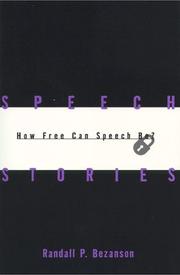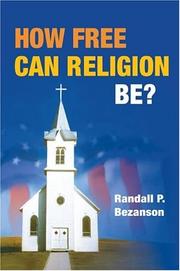| Listing 1 - 9 of 9 |
Sort by
|

ISBN: 0814713211 0814723438 0585316996 9780585316994 0814713203 9780814713204 9780814713211 9780814723432 Year: 1998 Publisher: New York New York University Press
Abstract | Keywords | Export | Availability | Bookmark
 Loading...
Loading...Choose an application
- Reference Manager
- EndNote
- RefWorks (Direct export to RefWorks)
When we talk about what "freedom of speech" means in America, the discussion almost always centers on freedom rather than speech. Taking for granted that speech is an unambiguous and stable category, we move to considering how much freedom speech should enjoy. But, as Randall Bezanson demonstrates in Speech Stories, speech is a much more complicated and dynamic notion than we often assume. In an age of rapidly accelerated changes in discourse combined with new technologies of communication, the boundaries and substance of what we traditionally deem speech are being reconfigured in novel and confusing ways. In order to spark thought, discussion, and debate about these complexities and ambiguities, Bezanson probes the "stories" behind seven controversial free speech cases decided by the Supreme Court. These stories touch upon the most controversial and significant of contemporary first amendment issues: government restrictions on hate speech and obscene and indecent speech; pornography and the subordination of women; the constitutionality of campaign finance reform; and the treatment to be accorded new technologies of communication under the Constitution. The result is a provocative engagement of the reader in thinking about the puzzles and paradoxes of our commitment to free expression.
Expression [Freedom of ] --- Free expression --- Freedom of expression --- Freedom of speech --- Liberty of expression --- Liberty of speech --- Liberté d'expression --- Meningsuiting [Vrijheid van ] --- Speech [Freedom of ] --- Vrijheid van meningsuiting --- Freedom of speech -- United States. --- Constitutional Law - U.S. --- Law - U.S. --- Law, Politics & Government --- United States

ISBN: 1283097494 9786613097491 0252090535 0252031121 9780252031120 9780252090530 9781283097499 6613097497 Year: 2006 Publisher: Urbana
Abstract | Keywords | Export | Availability | Bookmark
 Loading...
Loading...Choose an application
- Reference Manager
- EndNote
- RefWorks (Direct export to RefWorks)
Book
ISBN: 0252090543 9780252090547 9780252075209 025207520X 9780252034893 9780252076749 9780252091735 0252091736 128302893X 9781283028936 0252076745 1952076749 9781952076749 0252034899 9786613028938 6613028932 Year: 2008 Publisher: Urbana, Ill. Chesham University of Illinois Press Combined Academic [distributor]
Abstract | Keywords | Export | Availability | Bookmark
 Loading...
Loading...Choose an application
- Reference Manager
- EndNote
- RefWorks (Direct export to RefWorks)
Freedom of speech --- Oral history --- Women --- Sino-Japanese War, 1937-1945 --- History --- Oral biography --- Oral tradition --- Human females --- Wimmin --- Woman --- Womon --- Womyn --- Females --- Human beings --- Femininity --- Chinese-Japanese War, 1937-1945 --- Japan-China War, 1937-1945 --- Japanese-Chinese War, 1937-1945 --- Second Sino-Japanese War, 1937-1945 --- Sino-Japanese Conflict, 1937-1945 --- Women. --- Methodology --- Chongqing (China) --- Chungking, China --- Chungking (China) --- Chunt︠s︡in (China) --- Jūkei (China) --- Chongqing Shi (China) --- Chʻung-chʻing shih jen min cheng fu (China) --- Chʻung-chʻing shih (China) --- Tchong-K'ing (China) --- Tchongking (China) --- Tschungking (China) --- 重庆 (China) --- 重庆市 (China) --- Social conditions --- History, Military --- Civil rights --- Freedom of the press. --- Censorship of the press --- Freedom of the press --- Liberty of the press --- Press --- Press censorship --- Censorship --- Freedom of expression --- Government and the press --- Law and legislation
Book
ISBN: 9780252034435 Year: 2009 Publisher: Urbana Chicago University of Illinois Press
Abstract | Keywords | Export | Availability | Bookmark
 Loading...
Loading...Choose an application
- Reference Manager
- EndNote
- RefWorks (Direct export to RefWorks)
Book
ISBN: 9781512802795 Year: 2015 Publisher: Philadelphia
Abstract | Keywords | Export | Availability | Bookmark
 Loading...
Loading...Choose an application
- Reference Manager
- EndNote
- RefWorks (Direct export to RefWorks)
Digital
ISBN: 9780814723432 9780814713204 Year: 2020 Publisher: New York, N.Y. New York University Press
Abstract | Keywords | Export | Availability | Bookmark
 Loading...
Loading...Choose an application
- Reference Manager
- EndNote
- RefWorks (Direct export to RefWorks)
Digital
ISBN: 9781512802795 9780812232127 Year: 2015 Publisher: Philadelphia, Pa University of Pennsylvania Press
Abstract | Keywords | Export | Availability | Bookmark
 Loading...
Loading...Choose an application
- Reference Manager
- EndNote
- RefWorks (Direct export to RefWorks)
Book
ISBN: 058512647X 0812232127 1512802794 Year: 1994 Publisher: University of Pennsylvania Press
Abstract | Keywords | Export | Availability | Bookmark
 Loading...
Loading...Choose an application
- Reference Manager
- EndNote
- RefWorks (Direct export to RefWorks)
Book
ISBN: 1283712687 0252094220 9780252037115 9780252094224 0252037111 9781283712682 0252081234 Year: 2012 Publisher: Urbana [Illinois]
Abstract | Keywords | Export | Availability | Bookmark
 Loading...
Loading...Choose an application
- Reference Manager
- EndNote
- RefWorks (Direct export to RefWorks)
"In this project Randall Bezanson examines judicial interpretations of free speech by means of a broad range of Supreme Court cases, arguing that over the past 15 years the Court has engaged in a truly revolutionary expansion of the reach of the free speech guarantee. The cases include the much-discussed Citizens United decision which granted the full measure of constitutional protection to speech by corporations; the Doe v. Reed case from Washington State that recognized the acts of signing petitions and voting in elections as acts of free speech; the Summum decision holding that the decision to select a monument for a public park and to reject another based on the government's disagreement with the monument's message is an act of government speech immunized from challenge by the First Amendment; and the Hurley and Dale cases that recognized free speech claims for messages and meanings that arose "out of thin air": speech without an author (a parade); and an author without a message (the Boy Scouts). As in earlier books on freedom of the press and of religion, Bezanson aims to arm the reader with the capacity to reach her or his own decision about whether the Court's conduct befitted the independent judicial branch and the consequences of its decisions for a representative democracy"-- "Randall P. Bezanson takes up an essential and timely inquiry into the Constitutional limits of the Supreme Court's power to create, interpret, and enforce one of the essential rights of American citizens. Analyzing contemporary Supreme Court decisions from the past fifteen years, Bezanson argues that judicial interpretations have fundamentally and drastically expanded the meaning and understanding of "speech." Bezanson focuses on judgments such as the much-discussed Citizens United case, which granted the full measure of constitutional protection to speech by corporations, and the Doe vs. Reed case in Washington state, which recognized the signing of petitions and voting in elections as acts of free speech. In each case study, he questions whether the meaning of speech has been expanded too far and critically assesses the Supreme Court's methodology in reaching and explaining its expansive conclusions"--
| Listing 1 - 9 of 9 |
Sort by
|

 Search
Search Feedback
Feedback About UniCat
About UniCat  Help
Help News
News